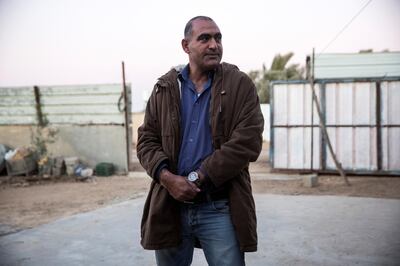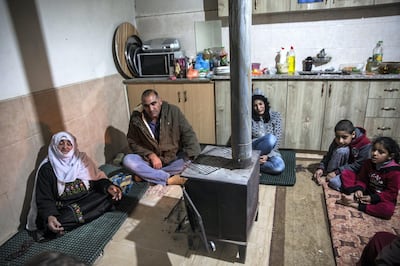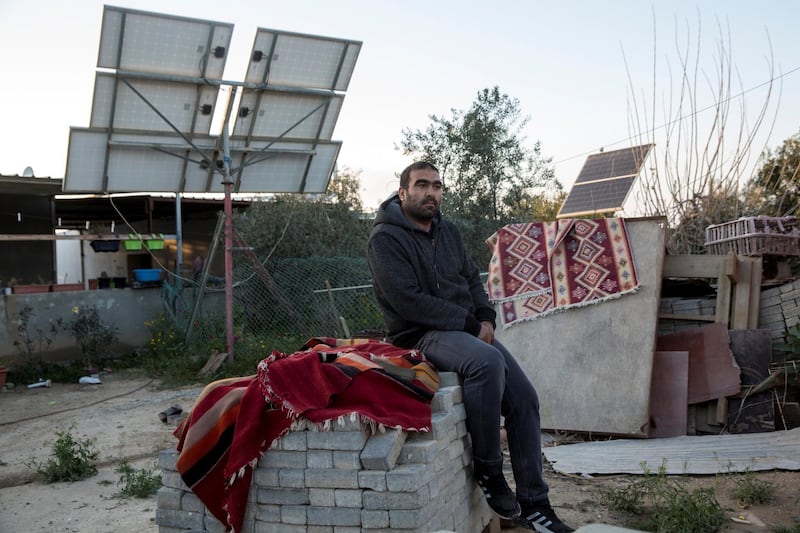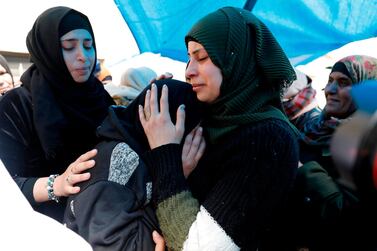Jaber Abu Queder has a difficult case to make: convincing his village to vote in Israel's parliamentary elections on Tuesday, despite the fact that the government does not recognise, and ultimately aims to dismantle, his small Bedouin settlement in the Negev Desert. The modest homes in his village are solar powered, as there are no municipal services such as electricity, and reachable only if you know the inauspicious path leading from the nearby highway.
"Those who boycott [elections] are only playing Israel's game," said Jaber Abu Queder, 51, head of the local council of the unrecognised village of Zarnuk in southern Israel. Not voting "doesn't benefit the [Bedouin] community's interests".
Another, younger local leader, Mohamed Abu Queder, of the same extended Queder tribe, is less sure.
"The elections aren't going to result in a positive direction," Mr Abu Queder, 35, told The National. "All of the Israeli political parties don't care about my issues. I could vote for the Arab parties. But until now I haven't decided."
Ultimately the younger Queder said he would vote for the Islamist-leaning Arab party – or not all. And, if he does vote, he will have to travel across a rocky road up to 20 kilometres to another village, as there is no voting location in his village, which is officially considered off the map in Israel.
“I’ve lost hope in the elections,” he said. “Unfortunately they won’t change much.”
The two men represent both a generational and an ideological divide that many Bedouins are grappling with ahead of elections: whether to vote or not for a government that appears to care little for their community.
The election this week has become a referendum on Prime Minister Benjamin Netanyahu, who, amid looming corruption charges, has been ramping up anti-Arab rhetoric as a core part of his campaign.
Mr Netanyahu has strong challenger in former military chief Benny Gantz and his alliance of centrist politicians and former generals in the newly established Blue and White Party.
Arab and Palestinian citizens of Israel, who are nearly 21 per cent of the population of almost 9 million, could in theory tip the scale. But in practice, the Arab vote has remained marginalised in Israel's coalition-style politics, in which the Arab parties are permanent fixtures of the opposition.
On the last election day in 2015, Mr Netanyahu rallied voters by warning that the Arabs were voting in "droves". This time around, Mr Netanyahu amped up the anti-Arab rhetoric from the start, disparaging Mr Gantz as a leftist who will make an alliance with Arab parties – despite Mr Gantz’s repeated denials that he would never partner with the Arab parties if he won.

In the 2015 election, Arab and Palestinian voters did come out in large numbers, bolstered by an alliance of the four leading Arab-majority parties into a coalition called the Joint (Arab) List. This year, however, the Joint List has split into two, marred by internal ideological and personal differences.
Several polls show, on the one hand, a drop in the expected number of Arab voters on election day. The dissolution of the Joint List, coupled with political developments like last summer’s Nation State Law – which, in Mr Netanyahu’s own words, legislated that “Israel is the nation-state of the Jewish people, and them alone", – have left people disillusioned with their options and participation in the system at all.
At the same time, other polling has shown that developments like Mr Netanyahu's electoral alliance with Jewish supremacy groups have rallied some Arab citizens to get there to vote Mr Netanyahu out. Nonetheless, Palestinian politicians inside Israel are worried.
All of these challenges are even more pronounced for the Bedouin communities living down south, where their traditionally isolated way of life is being tested by both political and social changes.
Israel's Palestinian and Arab citizens are diverse, including Druze, Christian, Muslim and other minority communities. These populations are citizens of Israel unlike the Palestinians living in the West Bank, Gaza Strip and East Jerusalem.
About 30 per cent of Israel's 260,000 Bedouins live among 35 villages that the state does not recognise. These settlements are cut off from water, electricity, public transportation, among other municipal services, and rarely have schools or health clinics nearby. Israeli authorities frequently demolish illegally built structures. Successive Israeli governments have put forth plans to move the Bedouin out of their villages into planned cities or recognised villages, and then develop the emptied land for infrastructure or commercial projects.
As citizens of Israel, the Zarnuk community of 5,000 can vote. But as the state does not recognise their homes, they do not have a voting place inside the village. Instead, they have to travel anywhere from seven to 20 kilometres to vote in nearby recognised villages, as Zarnuk voters are split between three locations.
Adalah, the Legal Centre for Arab Minority Rights in Israel, has petitioned Israeli authorities to install voting booths in 11 unrecognised villages that have state-sponsored schools or clinics and to provide transportation to those who have to travel out to vote. Under Israeli law, the burden is on the state to ensure the democratic right to vote and be elected, said Sawsan Zaher, Adalah’s Attorney and Deputy General. Some Bedouin voters have to travel up to 50 kilometres on their own to vote.
“Every year we need to go to the courts to get our rights,” said Marwan Abu Frieh, 34, Naqab Office Coordinator and Field Researcher for Adalah. Zarnuk now has a small health clinic after a legal fight to set one up.

With the election this week, the courts and relevant authorities have so far rejected Adalah's request for special voting provisions by arguing that it would be akin to recognising the villages, as they did prior to the 2015 elections, according to Zaher.
“If the state opened a kindergarten, they can also put a voting box there,” said Ms Zaher. “It’s different from recognition.”
The Bedouin communities are divided between three types of settlements: a township, which includes the main Bedouin city of Rahat and six recognised villages; eleven more villages that Israel recognised in 2002 and now governed by local councils; and the remaining 35 unrecognised villages. People in the latter do not want to leave, Mr Abu Frieh said, because they fear losing their land and traditions to a restricted and regulated life in the planned settlements.
Yousef Azazma, 32, from the unrecognised village of Al Sir, is one such potential voter.
His village is a collection of ramshackle huts down a rocky, unpaved path across the main road from a larger, recognised Bedouin village, Segev Shalom. Mr Azazma used to work in a factory, until he was injured and left, he said. Now he raises camels. If he lived in a recognised village, Mr Azazma said he would have to spend significant time and money for state-approved training and permits to tend to animals, which he learnt to do as a child.
Mr Azazma has never voted in a national election and does not intend to this year.
“The majority of Bedouins don’t benefit,” he said.
Politicians come around election time, he said, otherwise they only see the state when authorities arrive to demolish houses. He is still holding out hope, though, that Israel will recognise his village.
“We were here before, [the state of Israel],” he said. “But we also go with the country and do what they want. There are things [in Israel] like health insurance and schools that in Arab countries aren’t available. But the government itself is racist.”
He continued: “There’s integration with the country. But at the same time the country treats you like you’re number two or three.”
The anti-Arab rhetoric of Mr Netanyahu and his competitor’s campaigns has only reinforced this feeling of exclusion.
“It hurts you on the inside,” said Mr Azazma.
The barriers to voting for unrecognised Bedouin villages particularly impacts women, said Jaber Abu Queder.
“We are a conservative society and it’s hard for the women to go vote in another village,” he said. “If they could vote in this village, a majority of women would go and vote.”
Sara, 35, who declined to give her last name for privacy reasons, is from the unrecognised village of Khashem Zana and isn’t planning to vote.
"It's useless," she told The National while waiting for a bus in Segev Shalom, where she was visiting a hospital that day with two of her eight children. Most women waiting for the bus declined to speak.
Sara said her husband votes but, up to now, she never has. If there was a voting box in her village, though, she said she likely would. Others agree.
"There's no doubt that if there was a voting box in our village, the number of people voting would go up," Jaber Abu Queder concluded.






